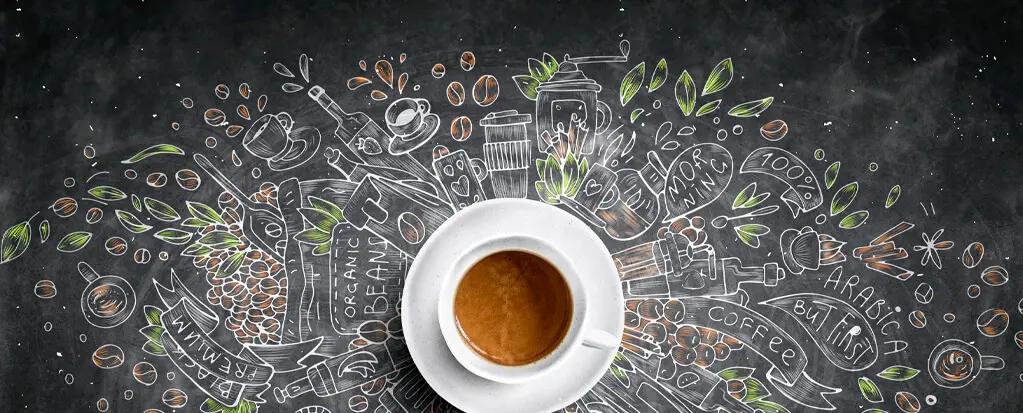They talk about machines, myths and the magic of a perfectly extracted espresso. If you want to delve deeper, you can download the full interview as a PDF at the end of this article.
Two professionals, two perspectives - concentrated knowledge from science and practice
Two worlds come together in this interview: the scientific curiosity of Professor Thomas Michaels, physicist at ETH Zurich, and the precision craftsmanship of Shem Leupin, master barista and roasting manager at Stoll Kaffee.
Leupin brings the experience from the cup, Michaels the theory from the laboratory. What they have in common: a fascination for coffee as a complex natural product and the conviction that good coffee is no coincidence, but the result of many well thought-out steps.
Say goodbye to myths: coffee needs knowledge, not belief
Many people drink coffee every day - but many know little about it. For example, many still believe that espresso contains significantly more caffeine than filter coffee. A misconception, as Michaels explains: "It's the brewing ratio that counts, not the name of the drink. Espresso is merely more concentrated, not stronger.
Another common misconception is the so-called "ristretto trick", where the espresso is stopped earlier. The aim is often to achieve a stronger taste - but the result is usually the opposite: an unbalanced drink with significantly fewer flavours.
An 'abbreviated' espresso does not produce a stronger coffee, but one with half as many flavours. - Thomas Michaels
The two experts debunk such misconceptions with their in-depth knowledge - and thus help us to focus on the essentials: quality and craftsmanship.
Preparation: the underestimated art
Many mistakes happen during preparation - not with the bean. Shem Leupin experiences this every day in the catering industry. Machines are often not set correctly, the grinders are not calibrated, the water is not filtered - and the machines are not clean. These are not details, but crucial quality factors.
Espresso machines need to be cleaned regularly - daily in cafés and at least weekly at home. - Shem Leupin
Michaels adds: "Coffee can also be prepared to a very high standard at home - provided you familiarise yourself a little with the physics behind it. The choice of the right grind, the extraction time, the brewing ratio - all of these influence the flavour, body and acidity profile of the cup.
I recommend taking a scientific approach to making coffee at home. - Thomas Michaels
That doesn't mean you need a laboratory - but a good scale, a reliable grinder and a feel for processes. If you follow a few rules, you can often make better coffee at home than many restaurants.
Speciality coffee & sensory analysis: the cup tells a story
Speciality coffee is not hype - it is the consequence of quality at every stage: from cultivation to processing and preparation. Shem Leupin explains that speciality coffees are rated according to a points system that focuses on aspects such as purity, complexity and acidity. These coffees bring the origin, the terroir, into the cup.
A good coffee brings the uniqueness of the bean into the cup. - Shem Leupin
It's not about elitism, but about flavour experiences. Light-coloured roasts with fruity acidity are not suitable for everyone - but with a little curiosity, you can open up whole new worlds. Filter coffee is often a good place to start, as it brings out the flavours more broadly and is less intense than espresso.
Coffee culture worldwide - from Chiasso to Ethiopia
Espresso at an Italian petrol station - for many, the epitome of perfect coffee. But is that really the case? Leupin clearly states that there are good and bad espressos in Italy too. The myth is often based on holiday memories rather than objective quality.
It gets interesting when Michaels talks about the differences between Zurich and Ticino: "In Ticino, coffee is more traditional, often with classic, stiff milk foam. In Zurich, on the other hand, you increasingly see modern coffee offerings - an influence of international communities.
The countries of origin are also an issue: in Ethiopia, the cradle of coffee, often only inferior goods remain in the country - the best beans are exported. This shows that coffee is both a global cultural asset and a sensitive commodity.
Harmless to health - even beneficial
In a separate information section, chemistry professor Chahan Yeretzian from the ZHAW clarifies four central health myths.
Conclusion: coffee is neither dangerous nor addictive - on the contrary. It contains antioxidants such as chlorogenic acids, which can even have a health-promoting effect. Up to five cups a day are considered safe - and even helpful for some people.
Conclusion: Quality needs attention - and clean water
The key message: Good coffee is not rocket science, but it does require attention. From filtered water to the degree of grinding to machine maintenance - every detail counts. And those who study flavour and origin discover a whole new world. Coffee is not just a drink. It is an experience that can be rediscovered every day.
 freshly roasted coffee
freshly roasted coffee  Free shipping from CHF 90.00
Free shipping from CHF 90.00 




